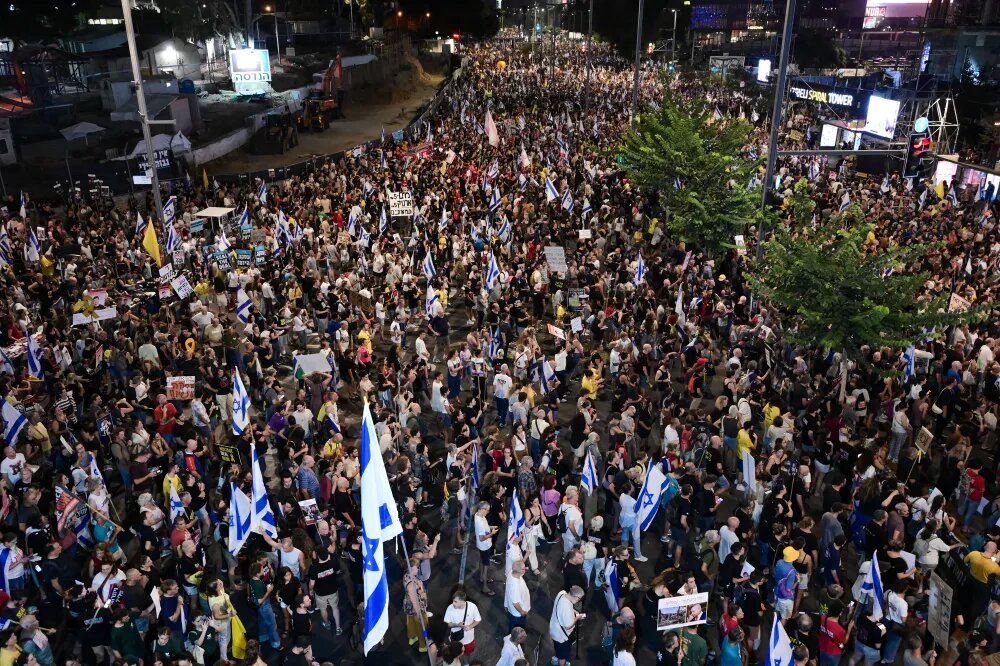Deepening cracks in the apartheid regime
Frustration spills over as 750,000 Israelis protest Gaza war failures

TEHRAN- Widespread disillusionment and deep divisions in Israel over the war in Gaza are back in the limelight in the wake of huge and unprecedented protests held in cities such as Tel Aviv at the weekend.
An estimated 750,000 people took to the streets in Israel on Saturday night. Organizers say 500,000 Israelis rallied in Tel Aviv marking the largest-ever demonstration in the regime’s history.
Some 250,000 others attended rallies in cities including Jerusalem (Al-Quds) and Haifa fuming over the Israeli army’s failure to return the remaining captives.
More than 11 months have passed since Prime Minister Benjamin Netanyahu ordered his army to invade Gaza after Hamas carried out a surprise military operation in southern Israel dubbed the Al-Aqsa Storm.
More than 1,100 people were killed during the Al-Aqsa Storm and 250 Israelis and foreigners were taken captive.
Around 100 captives still remain in Gaza, but about one-third of them are believed to be dead. Israel has freed eight captives and recovered the bodies of dozens of others. More than 100 of them were also released in a swap deal with Hamas in November last year.
Since the start of the war on October 7, the Israeli army has failed to achieve any its goals which mainly include the elimination of Hamas and returning captives.
Protesters in their weekend rallies called on Netanyahu to reach a deal with Hamas to secure the release of the captives.
“I think even those who were maybe reluctant to go out, who are not used to protest, who are sad but prefer to be in private space within their sadness, understood our voice must join together to one huge scream: Bring the hostages with a deal. Do not risk their lives,” said Efrat Machikawa, a protester in Tel Aviv and the relative of one of the captives.
Protests were marked by scuffles and police arrests.
Bibi must go!
Demonstrators in Jerusalem (Al-Quds) gathered outside Netanyahu’s residence calling for the release of the captives while chanting “the regime’s lies won’t bring about security”.
The demonstrators also called for an end to the Gaza war, the downfall of the Netanyahu cabinet, and another general strike to build up economic pressure for a deal.
Protesters also called for Bibi’s ouster in Caesarea, as they gathered near one of his private residences.
Protests over the release of captives have become a regular occurrence in Israel over the past months.
But Netanyahu has insisted that he will continue the war until “total victory” over Hamas. War minister Yoav Gallant said last month that Netanyahu’s “total victory” dream is nonsense and gibberish.
The Israeli premier stands accused of throwing a wrench into the ceasefire negotiations to keep himself in power. He considers a permanent state of war as a lifeline. This is because his cabinet will collapse if the war ends and he will be held to account for failing to prevent the Al-Aqsa Storm Operation.
Netanyahu has made up a new excuse to sabotage a ceasefire proposal that was laid out by US President Joe Biden in late May and welcomed by Hamas. The UN Security Council later approved a US resolution backing the ceasefire plan.
But Netanyahu has set new conditions to derail the talks.
He has dug in on his position that Israeli troops remain on the Philadelphi Corridor, along the Gaza-Egypt border, which is a major sticking point in the ongoing negotiations with the Hamas resistance movement.
The record number of Israelis who joined the Saturday rallies have even got wise to Netanyahu’s schemes. They have realized that the premier is ready to sacrifice captives to remain in power.
Israeli officials including Gallant and Chief of the General Staff Herzi Halevi have admitted that Netanyahu is using the Philadelphi Corridor as a pretext for his political interests.
Such developments have turned a spotlight on widening cracks within the Israeli establishment and society.
Besides, large protests have been held across the world in the past months calling for an end to the Gaza war.
Protests against Israel’s war of genocide which has so far claimed the lives of about 41,000 Palestinians in Gaza have highlighted the regime’s domestic and international isolation.
But such protests are the result of the strong resistance put up by Palestinians.
The Israeli army, through the unwavering support of the United States and some other Western allies, has failed to eliminate Hamas.
Israeli troops have suffered heavy blows at the hands of resistance fighters on the Gaza battlefield.
Resistance fighters have also dealt severe blows to the regime’s army during its recent large-scale assault on the occupied West Bank.
Growing rifts in Israel and the power of the Palestinian resistance will ultimately bring the occupiers to their knees and force them to retreat from Gaza with tails tucked firmly between their legs.
